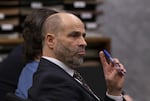For the last two weeks, witnesses have relived a few terrible moments on a TriMet light rail train traveling through Portland on May 26, 2017.
The testimony has been vivid and raw, the evidence overwhelming. Again and again, passengers recalled watching defendant Jeremy Christian scream slurs and then stab three men, two of whom died.
As the defense begins its case Monday, Christian’s attorneys won’t dispute key facts. Rather they''ll argue he acted in self-defense.
While the testimony has differed on some of the details, several witnesses say Christian was shouting at two black teens – one of whom was wearing a hijab.
The situation escalated. Some passengers intervened. The confrontation, captured on cell phones and security cameras, turned physical.
Passengers Ricky Best, Micah Fletcher and Taliesin Namkai-Meche were in the middle of it.
“Jeremy Christian shoved Taliesin first,” Amee Pacheco testified during the prosecution's case.
“Micah Fletcher gets involved?” asked Deputy District Attorney Jeff Howes.
Pacheco "mm hmm'd" her agreement.
“What’s happening now?" Howes said. "Describe it for me.”
“Jeremy Christian is pushing both of them."
“So, he pushed both Taliesin and Micah Fletcher?."
“Yes."
“At that point had either of them laid any hands on or made any physical threats towards Jeremy Christian?” Howes asked.
“No,” Pacheco said.
Fletcher told jurors he did push Christian, because he was trying to make him get off the train: “It was my intention to make sure to put him in a situation where he decided the best course of action was to leave," he said.

Micah Fletcher becomes emotional as he testifies about the experience of thinking he was going to die, and having to call his mother. Highly anticipated testimony from Micah Fletcher, who was seriously injured at the MAX stabbing incident, came on the morning of day six of the Jeremy Christian trial in Portland, February 4, 2020.
Beth Nakamura / The Oregonian/OregonLive/Pool
Christian responded by stabbing Fletcher in the neck with a knife; jurors have watched that moment on scream-filled videos captured by train security cameras and riders' phones.
“I thought he punched me, and I was getting my ready to guard against another one," Fletcher told jurors. "Then I noticed there was blood on my fingers. And I thought, that’s odd.”
Prosecutors said Christian also stabbed Namkai-Meche and Best. The attack lasted 12 seconds.
Christian faces a dozen criminal charges, including murder.
His family and friends could testify this week as the defense begins its case Monday. So could psychologists, who have raised questions about his mental health. And Christian could take the stand in his own defense.
He’s been outspoken at many court appearances as the case has made its way to trial. Over the last two weeks, Christian has made a few remarks during witness testimony. He's shaken his head in response to several witnesses and smirked at other moments.
Christian's defense team isn't expected to attempt refuting evidence of what happened on the train. Instead they will focus on why Christian behaved the way he did.
“We’re not basically disputing the most basic timeline or videos that were taken," said Dean Smith, one of Christian's public defenders. “The evidence that you’re going to have, again, is evidence we both see, have looked at and come up with different interpretations.”

Dean Smith, one of Christian’s defense attorneys, listens to the prosecutor's opening arguments.
Beth Nakamura / The Oregonian/OregonLive/Pool
Christian's attorneys acknowledge his diatribe on the train was offensive, but they say he was exercising his constitutional right to free speech.
They’re likely to talk about the fact he was drinking and has been diagnosed as being on the autism spectrum – factors they argue help explain Christian’s actions on the train.
Christian's defense team will argue that he believed he was under attack.
“Three against one?" Smith posed to jurors during his opening statement. "When you are defending yourself against three attackers, you cannot successfully defend yourself with hands and feet alone.”
The defense’s case is expected to last most of the week. After that prosecutors could put on rebuttal evidence, which would be followed by closing arguments.
